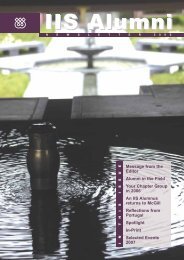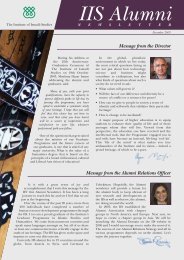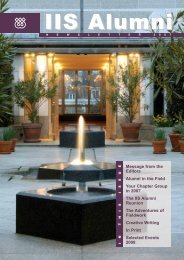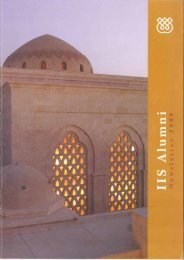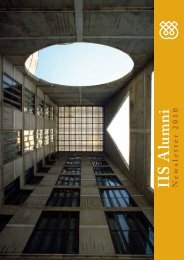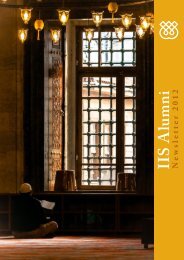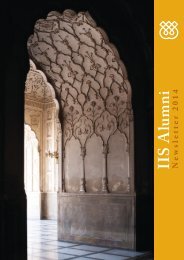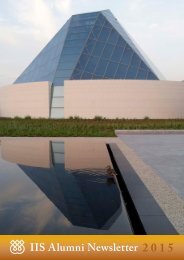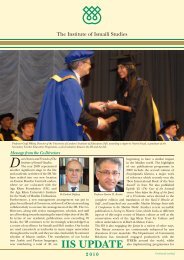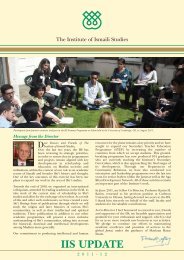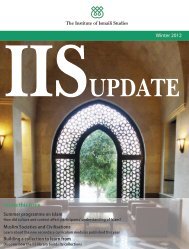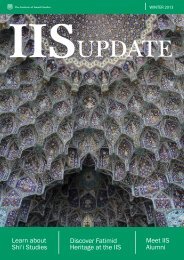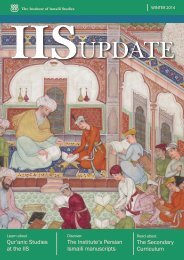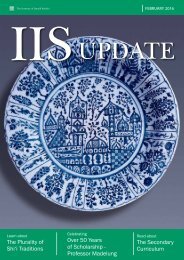IIS Brochure 2017
Create successful ePaper yourself
Turn your PDF publications into a flip-book with our unique Google optimized e-Paper software.
What some describe as a clash<br />
of civilisations in our modern world is,<br />
in my view, a clash of ignorances. This is<br />
why education about religious and cultural<br />
heritage is so critically important – and<br />
why we will continue to invest in these<br />
institutions. We deeply believe that<br />
scholarship, publication and instruction<br />
– of high quality and generous breadth –<br />
can provide important pathways toward<br />
a more pluralistic and peaceful world.<br />
His Highness the Aga Khan<br />
Chairman of the Board of Governors of The Institute of Ismaili Studies, London, UK<br />
3 July 2008<br />
2 3<br />
Motif on the window of the student halls of residence in King’s<br />
Cross. Image credit: Hufton + Crow.
Welcome<br />
The Institute of Ismaili Studies adopts a civilisational approach<br />
towards exploring the plurality of our contemporary world and its<br />
complex relationships with the intellectual and cultural traditions<br />
related to Muslim societies. It reaffirms the historical continuity<br />
of the Islamic tradition of seeking knowledge and learning that<br />
encompasses a wide breadth of fields, ranging from academic<br />
disciplines in the humanities and social sciences to more normative<br />
fields of study such as Islamic theology, jurisprudence and the<br />
study of the Qur’an and its commentaries (tafsir) through the ages.<br />
A set of two rock crystals and two gold seals of Imam Hasan ‘Ali Shah, Aga Khan I, from the <strong>IIS</strong>’ special<br />
collections. Image credit: Rahim Kara.<br />
Philosophical Statement 06<br />
Research 08<br />
Publications 10<br />
Scholarships and Fellowships 12<br />
Library 15<br />
Ismaili Special Collections 16<br />
Graduate Education 20<br />
Curriculum Development 23<br />
Continuing Education and Professional Development 24<br />
It is with great pleasure and distinct pride<br />
that I welcome you to The Institute of<br />
Ismaili Studies (<strong>IIS</strong>).<br />
Since its inception in London in 1977, The Institute of Ismaili<br />
Studies has been contributing to the building of knowledge<br />
and learning on Islam, in its historical as well as contemporary<br />
contexts. More specifically, the Institute’s programmes seek to<br />
promote research on those areas which have, to date, received<br />
relatively little attention from scholars. These include the<br />
intellectual and literary heritage of Shi‘i Islam in general, and<br />
Ismailism in particular.<br />
The Institute’s intellectual roots can be traced back eleven<br />
centuries to the time of the ruling Fatimid imam-caliphs.<br />
The Fatimid dynasty patronised learning and the arts, founding<br />
libraries and academic institutions such as Al-Azhar (considered<br />
to be the first Muslim university) and Dar al-‘Ilm (House of<br />
Knowledge) in Cairo, also extending hospitality and patronage<br />
to scholars from all religious traditions and cultural backgrounds.<br />
Building on the strength of its established research and<br />
publications programmes, the Institute maintains its reputation as<br />
the premier reference point for Ismaili studies, whilst increasingly<br />
becoming a pioneer for scholarship in Shi‘i and Qur’anic studies.<br />
The <strong>IIS</strong> also responds to the educational and learning needs of<br />
an increasingly dynamic and globalised Ismaili community by<br />
developing and producing early childhood, primary and secondary<br />
curricula, whilst training future scholars, teachers and leaders.<br />
Our library is the leading resource centre for academia as well<br />
as the Ismaili community, with growing collections of unique<br />
materials related to Muslim culture and Ismaili studies.<br />
Our special collections seek to preserve, archive, catalogue<br />
and digitise the valuable textual heritage and artefacts of the<br />
Ismaili community.<br />
The Institute is fortunate to be establishing its new permanent<br />
premises at a bespoke state-of-the-art education and research<br />
facility, located in the heart of London’s ‘Knowledge Quarter’,<br />
in King’s Cross. The Knowledge Quarter brings together academic,<br />
cultural, research, scientific and media organisations to generate<br />
the potential for knowledge sharing, and for creating greater<br />
access to the scholarship of partner institutions.<br />
In looking to the future, the <strong>IIS</strong> aspires towards continuing to<br />
adopt approaches to learning and knowledge production that<br />
engender attitudes of openness and dialogue towards scholarship<br />
and understanding.<br />
Dr Farhad Daftary,<br />
Co-Director of The Institute of Ismaili Studies<br />
4<br />
5
The Institute of Ismaili Studies (<strong>IIS</strong>) was<br />
established in 1977 with the objective of<br />
promoting scholarship and learning on Muslim<br />
cultures and societies, historical as well as<br />
contemporary, and encouraging a better<br />
understanding of their relationship with<br />
other societies and faiths.<br />
The Institute’s founding aim was defined by a basic and continuing<br />
re-assessment of existing scholarly endeavours in this field. As part<br />
of this aim, the Institute seeks to draw on the most effective tools<br />
developed, over at least the past century, in modern academic<br />
scholarship on Islam. Simultaneously, in actively seeking to bring the<br />
fruits of such scholarship to bear on the conditions and aspirations<br />
of Muslim societies today (including, in particular, present-day Ismaili<br />
communities) the Institute’s programmes reflect an additional,<br />
normative purposiveness, though one wholly open and attuned to<br />
the principles of objective inquiry and research, which are essential<br />
to a modern academic institution.<br />
This overarching objective implies certain general principles meant<br />
to guide the Institute’s scholarly programmes of research, teaching,<br />
and academic and educational publications. First, it favours an<br />
inter-connected study of past and present.<br />
...inter-connected study of past and present.<br />
Islamic history is thus studied with an eye to such resonances it may<br />
offer, directly or indirectly, to an analytic understanding of current<br />
realities and purposes in Muslim societies. Current realities, on<br />
their part, stand to gain from attention to their relationship, where<br />
appropriate, to the continued influence of traditions intrinsic to the<br />
intellectual and cultural history of Islam.<br />
...the scope of the classical Islamic civilisation included<br />
but was not confined to theological and religio-legal<br />
traditions.<br />
The second principle guiding the Institute’s programmes rests on<br />
the fact that the scope of the classical Islamic civilisation included<br />
but was not confined to theological and religio-legal traditions.<br />
These traditions, though important, evolved alongside philosophical,<br />
literary and more general artistic components. The totality of these<br />
traditions is liable to be neglected in narrowly religious approaches<br />
to Islam that are apt to miss both the breadth and plurality present<br />
in the classical Islamic world. The Institute’s programmes are<br />
designed in an acknowledgement of these features, that is, the<br />
manifoldness and pluralism of the classical Islamic world which,<br />
suitably understood, remain of continued interest and relevance<br />
to Muslim societies today<br />
Corresponding to this encompassing scope is the fact that the<br />
Muslim world has historically comprised (and continues to do so)<br />
a wide and proliferating range of cultures, ethnicities and linguistic<br />
groups. Of these, the Arabic language and Arabic nationalities,<br />
though of special significance due to the decisive role in Muslim<br />
history of the Qur’anic revelation, are otherwise only a part of the<br />
ancient as well as modern Islamic world. Accordingly, the Institute’s<br />
programmes, while devoting due attention to research in Qur’anic<br />
studies and instruction in the Arabic language, include the study<br />
of such areas beyond the Arabic-speaking world as it may be<br />
equipped, at any given time to undertake, and in so far as it is<br />
of interest to its constituencies.<br />
The totality of these traditions is liable to be neglected<br />
in narrowly religious approaches to Islam that are apt to<br />
miss both the breadth and plurality present in the classical<br />
Islamic world.<br />
The above principles are obviously general. However, the practical<br />
capacities of an academic institution are inevitably limited in<br />
scope. The <strong>IIS</strong>’ programmes are largely defined by the needs and<br />
purposes, so far as they draw on scholarship in Islam and related<br />
fields, of the Ismaili communities domiciled in various parts of<br />
the world today. For this reason a good part of the research<br />
and publication activities of the Institute, and in particular of<br />
its educational publications and programmes, are at present<br />
focused on the Ismaili jamats (communities); and, secondarily,<br />
on the complex of Shi‘i traditions within Islam, of which the<br />
Ismaili traditions are a part. This special focus of the Institute’s<br />
programmes does not negate, however, the importance of the<br />
overarching principles stated above.<br />
A portion of the Institute’s publications, research<br />
activities and graduate courses are devoted, to the<br />
extent that is viable, to studies in the more general<br />
fields of Islam and comparative religion, as well as<br />
such aspects of the humanities as have a relevance<br />
to the study of these fields.<br />
A portion of the Institute’s publications, research activities and<br />
graduate courses are devoted, to the extent that is viable, to<br />
studies in the more general fields of Islam and comparative<br />
religion, as well as such aspects of the humanities as have a<br />
relevance to the study of these fields. Moreover, all four of the<br />
areas hereby entailed – Ismaili, Shi‘i, generally Islamic and (where<br />
feasible) comparative religion and culture – will draw on such<br />
disciplinary approaches, e.g. history, linguistics, philosophy, literary<br />
criticism and social sciences, as are likely to contribute to the<br />
perspectives outlined above.<br />
In particular, it is expected that the field of ethics, which straddles<br />
the modern divide between religious and secular cultures as well<br />
as the humanities and social sciences presents special challenges<br />
today due to developments in modern technologies; and which by<br />
definition represents the normative aspiration, in human societies,<br />
for material and spiritual well-being, will feature importantly in the<br />
Institute’s programmes of research, teaching and publication.<br />
A Court Manuscript Workshop. Folio from the manuscript of Akhlaq-i Nasiri (Ethics of Nasir) by Nasir al-Din Tusi (d. 1274).<br />
Image credit: The Aga Khan Museum.<br />
Philosophical<br />
Statement<br />
6<br />
7
Research<br />
Dr Asma Hilali with Dr Stephen Burge, Research Associate at the <strong>IIS</strong>. Image credit: Mindaugas Orlauskas.<br />
Research at the <strong>IIS</strong> seeks to contribute to<br />
the field of Islamic studies in general, with a<br />
particular focus on Shi‘i and Ismaili studies.<br />
Reflecting the general principles that guide<br />
scholarship at the Institute, the approach to<br />
research is interdisciplinary and civilisational<br />
based, with a keen awareness of the range<br />
and diversity of cultures in which Islam is<br />
practised today.<br />
The <strong>IIS</strong> seeks in particular to promote research in hitherto<br />
marginalised areas of the study of Islam and its various<br />
interpretations, while also accentuating the plurality of the<br />
heritages that Muslim communities enfold. Doctoral scholarships<br />
in these areas, including, the intellectual and literary expressions<br />
of Shi‘i Islam in general, and the Ismaili tradition in particular, have<br />
become a key vehicle in realising the Institute’s research mandate.<br />
The Institute’s research focuses on four specific areas:<br />
Ismaili and Broader Shi‘i Studies<br />
The promotion of modern scholarship on the Ismailis and their<br />
intellectual and cultural heritages is a key part of the Institute’s<br />
mandate. Historically, the Ismailis have almost exclusively been<br />
studied through secondary sources compiled outside the<br />
community. In recent decades, the field of Ismaili studies has<br />
been revolutionised by the recovery and study of Ismaili sources,<br />
from diverse literary and intellectual traditions, written in Arabic,<br />
Persian and various Indic languages.<br />
Through its research, the Institute aims to contribute towards a<br />
more representative understanding of Shi‘i communities, situating<br />
them within the wider context of Islam. Scholars and research<br />
fellows also explore the traditions of Shi‘i Islam, considering the<br />
origins and early developments of various Shi‘i communities, as well<br />
as the intellectual and spiritual traditions of Shi‘i Muslims. These<br />
include topics related to theology, philosophy, law, hadith (prophetic<br />
traditions), tafsirs (commentaries and interpretations of the Qur’an),<br />
as well as Shi‘i contributions to the arts and humanities.<br />
Qur’anic Studies<br />
A research unit specifically focusing on Qur’anic Studies was<br />
established at the <strong>IIS</strong> in 2000, with the aim of promoting scholarship<br />
on the plurality of interpretations inspired by the Qur’an. Research<br />
and teaching about these interpretive traditions advance knowledge<br />
of the entire spectrum of sources and interpretations of Qur’anic<br />
tafsirs throughout Muslim history, whilst also shedding light on the<br />
various contexts and methodologies that have shaped them.<br />
Constituency Studies<br />
Constituency Studies engages in textual, historical, sociological<br />
and anthropological research, considering the diverse global<br />
contexts within which Ismaili communities live. It aims to explore<br />
the history, oral history and traditions of Ismaili communities and<br />
their heterogeneous contemporary realities, thereby informing<br />
the educational programmes of the <strong>IIS</strong>.<br />
Central Asian Studies<br />
The Central Asian Studies Unit examines the history, culture<br />
and traditions of the Ismaili and wider Shi‘i communities within<br />
the broader context of Muslim societies in Central Asia. The<br />
geographic scope of this research includes Tajikistan, Afghanistan,<br />
Northern Pakistan, Western China and the Russian Federation.<br />
8<br />
www.iis.ac.uk/research<br />
9
Publications<br />
The <strong>IIS</strong> publishes a wealth of original academic<br />
works in keeping with the four themes of<br />
its research mandate. A large portion of this<br />
scholarship is produced by faculty and researchers<br />
at the Institute and some in partnership and<br />
collaboration with external scholars.<br />
<strong>IIS</strong> publications are produced in collaboration with leading academic<br />
publishers in the field. Most books are first published in English, as<br />
well as critical editions in Arabic and Persian. A growing number of<br />
<strong>IIS</strong> publications are also translated into Tajik and Russian, as well as<br />
other European and Indic languages.<br />
<strong>IIS</strong> academic publications fall into several distinct and<br />
interrelated categories:<br />
Occasional papers address broad themes on<br />
the relationship between religion and society<br />
Monographs explore aspects of Islamic<br />
faith and culture and contributions of<br />
Muslim thinkers<br />
Editions and translations of primary or<br />
secondary texts<br />
Translations of literary texts illustrate the rich<br />
heritage of spiritual, devotional and symbolic<br />
expressions in Muslim history<br />
Works on Ismaili history and thought explore<br />
the relationships of the Ismailis to other traditions,<br />
communities and schools of thought in Islam<br />
Proceedings of conferences and seminars<br />
Bibliographical works and manuscript<br />
catalogues document manuscripts, printed<br />
texts and other source material of interest<br />
to the academic community<br />
The Institute publishes eight series of academic publications.<br />
Qur’anic Studies Series<br />
Published by Oxford University Press in association with the <strong>IIS</strong>,<br />
this series aims to make available some of the ever-proliferating<br />
commentaries and interpretations arising from intellectual and<br />
spiritual reflections on the Qur’an. In the Muslim world, the Qur’an<br />
has been subject to contending ideas and interpretations. The<br />
Qur’anic Studies Series takes no sides in these debates; rather it<br />
records the richness of approaches that have been applied to the<br />
Qur’an both in the past and in modern times.<br />
Shi‘i Heritage Series<br />
This series seeks to contribute to knowledge about Shi‘i Islam,<br />
covering a variety of Shi‘i interpretations while also promoting a<br />
better understanding of history, doctrines and practices of Shi‘i<br />
Muslims from medieval to contemporary manifestations. Utilising<br />
an interdisciplinary approach, the series aims to publish the most<br />
significant contemporary contributions to the study of Shi‘i Islam<br />
whilst encouraging further research in the field.<br />
Ismaili Heritage Series<br />
This series aims to publish the results of modern scholarship<br />
on the Ismailis and their rich intellectual and cultural heritages,<br />
as well as exploring aspects of their more recent history.<br />
Epistles of the Brethren of Purity Series<br />
This series, published by Oxford University Press in association<br />
with the <strong>IIS</strong>, consists of a multi-authored Arabic critical edition<br />
and annotated English translation of the Rasa’il Ikhwan al-Safa’, an<br />
encyclopaedic work comprised of 52 epistles which were originally<br />
composed during the tenth century in Iraq by an anonymous<br />
group of Muslim scholars.<br />
Ismaili Texts and Translations Series<br />
Recent progress in Ismaili Studies has been based on the recovery<br />
of a large number of Ismaili manuscripts. A good portion of such<br />
texts, in Arabic, Persian and Indic languages are preserved in<br />
the Ismaili Special Collections Unit of the <strong>IIS</strong>. The Ismaili Texts<br />
and Translations Series aims to produce critical editions of these<br />
hitherto unexplored or relatively inaccessible texts together with<br />
English translations and contextualising introductions that are<br />
essential for further progress in the field.<br />
Muslim Heritage Series<br />
This series explores themes that are central to Muslim civilisations,<br />
including the nature of religious authority, ethics and law, social justice<br />
and civil society, the arts and sciences, and the interplay of spiritual and<br />
secular life. In keeping with the Institute’s overarching principles, the<br />
series is navigated by the plurality of communities and interpretations<br />
of Islam, covering both modern and traditional worldviews.<br />
The World of Islam Series<br />
This series is aimed at general audiences seeking to learn about<br />
Islam as expressed across today’s global community. The diverse<br />
themes, ranging from historical narratives and geographic<br />
explorations to famous figures and cultural heritages, are united<br />
in their aim of linking past and present, to celebrate and elucidate<br />
the cosmopolitan world of Islam.<br />
Encyclopaedia Islamica<br />
This 16-volume encyclopaedia, under the general editorship of<br />
Professor Wilferd Madelung and Dr Farhad Daftary, represents an<br />
abridged and edited English translation of the Persian Da’irat al-Ma‘arif-i<br />
Buzurg-i Islami (The Great Islamic Encyclopaedia), one of the most<br />
comprehensive works of reference on Islam and the Muslim world.<br />
10<br />
www.iis.ac.uk/publications<br />
11
Zulfikar Khimani and Dr Zamira Dildorbekova, two recipients of the Institute’s PhD scholarship<br />
programme. Image credit: Mindaugas Orlauskas.<br />
Scholarships<br />
and fellowships<br />
The Institute offers a number of scholarship and<br />
fellowship programmes for applicants interested<br />
in contributing to scholarship in Islamic studies.<br />
Scholarships<br />
Dissertation Writing Scholarship<br />
This scholarship is awarded annually to promising doctoral<br />
candidates to assist them in completing their dissertations.<br />
Doctoral Scholarship Programme<br />
The Institute awards doctoral scholarships each year to suitable<br />
candidates. Special attention is given to proposals in any field<br />
or discipline on the Ismailis or their contributions to Islamic<br />
civilisations, teacher education and curriculum studies. The<br />
scholarships are also awarded for a variety of disciplines within<br />
the humanities.<br />
Mohammed Arkoun Doctoral Scholarship<br />
The late Professor Mohammed Arkoun (1928–2010) was a Senior<br />
Research Fellow at the <strong>IIS</strong> and a member of the Institute’s Board<br />
of Governors. This scholarship was established in recognition of<br />
the contributions Professor Arkoun has made to Islamic studies.<br />
The doctoral scholarship is awarded once every four years to a<br />
graduate student pursuing research of relevance to the work of<br />
Professor Arkoun.<br />
Fellowships<br />
Annemarie Schimmel Fellowship<br />
Professor Annemarie Schimmel (1922–2003) was a faculty<br />
member of the <strong>IIS</strong>. This fellowship was established in 2004 to<br />
commemorate her scholarly achievements. It is awarded every<br />
three years to a scholar working in the fields of interest to the late<br />
Professor Schimmel, such as Islamic mysticism and the literary and<br />
artistic expressions of Muslim devotional traditions. The award is<br />
intended to assist the recipient to complete research leading to<br />
the publication of a book.<br />
Post-Doctoral Fellowships<br />
Post-Doctoral fellowships are awarded to graduates of the <strong>IIS</strong><br />
doctoral scholarship programme, or to other doctoral graduates,<br />
for the duration of one academic year to allow the recipients to<br />
prepare their dissertations for publication through the <strong>IIS</strong>.<br />
Senior Research Fellowships<br />
These honorary fellowships are awarded to scholars with a long<br />
and distinguished academic career. Their affiliation to the <strong>IIS</strong><br />
is designed to be an opportunity for further research and the<br />
publication of works reflecting the interests of the Institute.<br />
Visiting Fellowships<br />
Lasting up to one academic year, these fellowships are intended<br />
for academics undertaking research projects in fields of interest to<br />
the Institute, enabling them to complete their research at the <strong>IIS</strong>.<br />
Zahid 'Ali Fellowship<br />
This fellowship was established in 1997 in the name of Professor<br />
Zahid ‘Ali (1888–1958), a pioneer of modern Ismaili studies.<br />
The Zahid ‘Ali Fellowship is awarded once every five years to a<br />
renowned scholar working in the field of classical Arabic literature.<br />
12 13<br />
www.iis.ac.uk/fellowships-and-scholarships
Library<br />
Left & below: <strong>IIS</strong> students in the library.<br />
Image credit: Mindaugas Orlauskas.<br />
The Library includes significant printed collections of Ismaili works<br />
comprised of rare and special material and unpublished theses.<br />
At the heart of the rare books collection is a set of Post-Tanzimat<br />
Ottoman publications, as well as items from the personal<br />
collections of scholars, such as the late Professor Annemarie<br />
Schimmel (1922-2003), the late scholar of Persian literature<br />
Peter Avery (1923-2008) and the archive of the late Professor<br />
Mohammed Arkoun (1928-2010).<br />
Besides its rare and special collection, the Library has core<br />
collections in Islamic studies and Muslim civilisations. Whereas<br />
the Ismaili holdings provide a specialised focus, the general<br />
collection has been planned on the basis of need, reflecting<br />
the academic and research activities of the two Institutes.<br />
To supplement the core printed collection, the Library provides<br />
access to some 12,500 titles in electronic format. Covering a wide<br />
range of study areas, these titles include monographs, academic<br />
journals, magazines, conference proceedings and reports.<br />
The Institute of Ismaili Studies (<strong>IIS</strong>) and the<br />
Aga Khan University – Institute for the Study<br />
of Muslim Civilisations (AKU-ISMC) run a joint<br />
library to meet the teaching and research activities<br />
of both instiutions. The library has developed and<br />
preserved a unique collection that serves a diverse<br />
range of students and academics in the field of<br />
Islamic studies including a substantial collection<br />
of Ismaili printed material. In its relatively short<br />
history, the library has evolved into a leading<br />
centre and repository for rare and significant<br />
resources illustrative of all facets of Ismaili history<br />
and thought.<br />
The Library has been creating a collection of audio-visual material<br />
that illustrate the cultures and traditions of Muslims covering a<br />
wide range of themes and regions, including Afghanistan, Iran,<br />
Egypt, Central Asia, Morocco and Tunisia, as well as Muslim<br />
diaspora communities in Europe and North America. In addition<br />
to this, qawwali music from the Indian subcontinent, sufi music<br />
from Iran and Turkey, as well as gnawa music from North Africa<br />
and sub-Saharan Africa, are also available.<br />
In addition to discharging its main mandate as the supporting unit<br />
for research and teaching activities of the <strong>IIS</strong> and AKU-ISMC,<br />
the Library plays a role in supporting the educational and human<br />
resource development programmes of the Ismaili Tariqah and<br />
Religious Education Boards (ITREBs) around the globe.<br />
14<br />
www.iis.ac.uk/library<br />
15
An illuminated page from an Indo-Persian manuscript dedicated to hunting, from the <strong>IIS</strong>’ special collections.<br />
Image credit: Mindaugas Orlauskas.<br />
Ismaili Special<br />
Collections<br />
The preservation of items that elucidate the<br />
heritages of the Ismaili communities has been<br />
an integral part of the Institute’s work since its<br />
inception. The Ismaili Special Collections Unit<br />
has a mandate that includes facilitating research<br />
projects based on items within the collection,<br />
as well as managing, preserving and facilitating<br />
access to this unique collection of Ismaili<br />
heritage materials.<br />
The Institute’s special collection includes manuscripts, rare and<br />
special printed materials, coins and artefacts and archival materials<br />
as well as photographs and audio-visual materials. The manuscript<br />
collection consists of some 3,000 manuscripts in Arabic, Persian<br />
and Indic languages. These include Ismaili works and general Islamic<br />
titles on aspects of Islamic history and thought. The coin and artefact<br />
collection includes coins from the Fatimid and Alamut periods of<br />
Ismaili history, medals, inscriptions and memorabilia.<br />
Dr Wafi Momin and staff from the Ismaili Special Collections<br />
Unit. Image credit: Areez Charania.<br />
16<br />
www.iis.ac.uk/special-collections<br />
17
Exterior of student halls of residence in King’s Cross. Image credit:<br />
Hufton + Crow.<br />
Our new home<br />
At the heart of King's Cross London, a<br />
new purpose built space for teaching<br />
and learning, designed by Pritzker prize<br />
winning architect Fumihiko Maki and a<br />
halls of residence for students, designed by<br />
award winning architects Stanton Williams.<br />
The two buildings will be symbolically<br />
connected by a ribbon of gardens inspired<br />
by the history, the landscape and the<br />
diverse culture of gardens found in the<br />
Muslim world.<br />
18<br />
Render of the new academic building in King’s Cross.<br />
Image credit: Maki & Associates.<br />
One of the gardens at the student halls of residence in King’s<br />
Cross – inspired by the beautiful gardens of Andalusia,<br />
Spain. Image credit: Hufton + Crow<br />
19
Graduate<br />
Education<br />
The <strong>IIS</strong> offers two graduate programmes:<br />
• Graduate Programme in Islamic Studies<br />
and Humanities (GPISH) culminating<br />
in a master’s degree, from a British<br />
university.<br />
• Secondary Teacher Education<br />
Programme (STEP) culminating in an<br />
MA and PG Diploma awarded by<br />
IOE Institute of Education, University<br />
College London.<br />
Both programmes seek to explore the relationship of religious ideas<br />
within the wider contexts of society and culture, encouraging a<br />
perspective that is not confined to the theological heritages of Islam.<br />
The student body is diverse and brings together a range of cultural<br />
and social backgrounds, creating a thriving environment for learning,<br />
both inside and outside the lecture room.<br />
The Institute’s primary aim with regards to students is to<br />
stimulate the development of a civilisational and critically oriented<br />
understanding and appreciation of Muslim cultures. At the same<br />
time, the <strong>IIS</strong> aims to equip students to pursue successful and<br />
sustainable careers, both within academia and education, as well<br />
as in other professional settings where the knowledge and skills<br />
acquired during their time at the <strong>IIS</strong> can be deployed for the<br />
benefit of the local and global Ismaili communities.<br />
Dr Omar Ali-de-Unzaga teaching a class of GPISH students. Image credit: Mindaugas Orlauskas.<br />
The Institute collaborates with other institutions of higher learning<br />
to deliver its programmes. The two <strong>IIS</strong> programmes draw on<br />
faculty from our research department, as well as visiting scholars<br />
from leading national and international academic institutions.<br />
In keeping with higher education practice in the UK, the <strong>IIS</strong> is<br />
reviewed annually by the Quality Assurance Agency for Higher<br />
Education (QAA).<br />
Graduate Programme in Islamic Studies<br />
and Humanities (GPISH)<br />
GPISH is an innovative, interdisciplinary three-year programme<br />
in Islamic studies and the humanities. The first two years are<br />
spent at the <strong>IIS</strong>, followed by a third year at a university in the UK,<br />
during which the students pursue a master’s degree in a field of<br />
their choice.<br />
In steering away from the traditional divisions of academic<br />
disciplines, the GPISH programme employs the frameworks and<br />
critiques of the social sciences and humanities as its academic<br />
tools. We seek to integrate these discourses as approaches to<br />
the study of Muslim cultures and societies; with the aspiration of<br />
producing an integrated analysis of Islam, as a civilisation as well<br />
as a religion.<br />
Past graduates of GPISH are contributing to society at large<br />
as scholars, professionals and change agents through careers<br />
and research in fields as diverse as Islamic studies, Islamic law,<br />
governance, education, public health, ethnomusicology, art<br />
history, media studies and development. They are in demand in<br />
competitive professional environments because of their strong<br />
analytical and communication skills, as well as their versatility<br />
and global perspective.<br />
Secondary Teacher Education Programme<br />
(STEP)<br />
STEP is a two year programme aimed at developing professional<br />
educators to facilitate and teach the Institute’s Secondary<br />
Curriculum to Ismaili students worldwide.<br />
It integrates a postgraduate diploma in teaching and reflective<br />
practice with a humanistic and civilisational approach to the study of<br />
Islam (MA Education in Muslim Societies and Civilisations), through<br />
a pioneering collaboration with UCL Institute of Education. As part<br />
of their training, teaching practice gives students the opportunity to<br />
develop their classroom skills and become self-directed managers<br />
of learning in a classroom. The programme offers a career path in<br />
teaching within the context of both religious and secular education.<br />
On completing the programme, graduates put into practice the<br />
knowledge and critical skills acquired through STEP, in education<br />
roles that benefit their local communities, many of which are based<br />
in developing countries.<br />
Alumni<br />
The <strong>IIS</strong> alumni live and work in more than 25 countries around the<br />
world. Many have continued to pursue research while others have<br />
taken up professional careers primarily in academic, educational<br />
and development organisations. The <strong>IIS</strong> facilitates the continuing<br />
intellectual and professional development of alumni through<br />
programmes exclusively for <strong>IIS</strong> graduates, including access to<br />
research grants and membership of the <strong>IIS</strong> Alumni Association,<br />
which holds annual meetings and academic seminars in three<br />
regions of the world.<br />
20<br />
Dr Laila Halani with GPISH students. Image credit: Mindaugas Orlauskas.<br />
www.iis.ac.uk/graduatestudies<br />
21
Curriculum<br />
Development<br />
A core part of the educational mandate<br />
of the Institute is the development of an<br />
international curriculum for the global<br />
Ismaili community, covering pre-school<br />
to secondary age groups.<br />
The <strong>IIS</strong> produces a range of educational materials and resources<br />
on Islam, approached from interdisciplinary perspectives, for use<br />
by teachers, parents and students located in over 25 countries.<br />
The curriculum adopts a multilingual approach, with the materials<br />
published in Arabic, Dari, English, French, Gujarati, Persian,<br />
Portuguese, Russian, Tajik and Urdu.<br />
The pre-school, primary and secondary curricula form the basis of<br />
religious and cultural education programmes organised by the<br />
Ismaili community globally. The educational materials examine Islam<br />
as both faith and civilisation, historically and in contemporary times.<br />
The curriculum approaches the study of Islam in general, and the<br />
Shi‘i Ismaili tradition specifically, from humanistic, civilisational<br />
and normative perspectives. Its overall aim is to educate young<br />
Ismailis in the faith, ethics, history and cultures of Muslim societies<br />
and the Ismaili Muslim community in particular.<br />
At the pre-school and primary levels, the curriculum draws upon<br />
modern principles of education to make learning a creative and<br />
engaging experience for young minds. It aims to promote personal<br />
development, learning and moral responsibility through instructional<br />
approaches which encourage creativity and reflection.<br />
The Secondary Curriculum presents a modular programme<br />
in religious education and the humanities, seeking to bridge<br />
religious and secular education. Among the subjects covered<br />
are civilisation and society, encounters in Muslim history,<br />
Muslims in the contemporary world, intellectual traditions,<br />
ethics and human development, faith and practice, the Qur’an<br />
and its interpretations, and the literature of Muslim societies. In<br />
presenting these subjects, the curriculum aims to address themes<br />
of relevance to youth and their communities in different regions<br />
of the world.<br />
A selection of volumes from the<br />
Institute’s Secondary Curriculum.<br />
Image credit: Mindaugas Orlauskas.<br />
The curriculum applies pedagogical approaches consonant<br />
with its philosophical framework. It calls for a profile of teachers<br />
with a broad set of abilities which reflect an understanding of a<br />
range of interdisciplinary subjects and contexts. For this purpose,<br />
the Secondary Curriculum is taught by professionally qualified<br />
teachers who are graduates of the <strong>IIS</strong>’ Secondary Teacher<br />
Education Programme (STEP).<br />
As students and teachers progress through the curriculum,<br />
they acquire a perspective on Islam which is grounded in an<br />
informed understanding and intellectual appreciation of their<br />
own faith, together with respect for the beliefs of other<br />
communities, equipping them with the tools necessary to<br />
assume their proper place in the emerging civil and global<br />
societies of the twenty-first century.<br />
22<br />
Muslim Societies & Civilisations module, part of the Secondary Curriculum series.<br />
Image credit: Mindaugas Orlauskas.<br />
www.iis.ac.uk/learningcentre/curriculum<br />
23
<strong>IIS</strong> Summer Programme on Islam held at York University in Toronto, Canada. Photo credit: <strong>IIS</strong>.<br />
24<br />
Continuing Education and<br />
Professional Development<br />
The Institute provides human resource development and continuing education<br />
opportunities for various constituency segments within the Ismaili community,<br />
with a view to enriching the intellectual and leadership capacity of the<br />
community in various parts of the world.<br />
Key programmes offered by the <strong>IIS</strong> include:<br />
International Training Programme<br />
A human resource development programme to develop educators<br />
who support the religious, ethical and cultural education of Ismaili<br />
communities globally. The programme is based on a blended<br />
learning model consisting of distance learning, fieldwork, research<br />
and residential components consisting of two three-week episodes,<br />
usually held in Dubai, UAE. Over the past ten years this<br />
programme has contributed to the education endeavours of<br />
the Ismaili Tariqah and Religious Education Boards across<br />
28 countries. The programme is offered in English and Persian.<br />
Continuing Professional Development<br />
of Educators<br />
A blended learning programme to assist the ongoing professional<br />
development of secondary teachers from more than 20 countries<br />
who have graduated from the <strong>IIS</strong>’ STEP programme and who<br />
support the religious education, ethical and cultural formation<br />
of Ismaili youth globally.<br />
Continuing Education Programme<br />
This initiative offers short residential courses taught by prominent<br />
academics from the <strong>IIS</strong>, AKU-ISMC and other institutions.<br />
Participants from all over the world are introduced to a social,<br />
cultural and civilisational approach to the study of Islam and<br />
Muslim societies, situating the Ismailis within the broader<br />
intellectual and historical development of Islam and reflecting<br />
upon the contemporary challenges faced by Muslim communities.<br />
Leadership Development Programmes<br />
Short executive programmes for institutional leaders in Ismaili<br />
communities across the world. The programmes include themes<br />
relevant to Muslim cultures and civilisations, ethics, education,<br />
organisational behaviour, and leadership qualities.<br />
25
Captions and credits<br />
Inside front cover: Motif on the window of the student halls of<br />
residence in King’s Cross, London. Image credit: Hufton + Crow.<br />
Page 4: A set of two rock crystals and two gold seals of Imam<br />
Hasan ‘Ali Shah, Aga Khan I (d. 1881), from the <strong>IIS</strong>' special<br />
collections. Image credit: Mindaugas Orlauskas.<br />
Page 5: Dr Farhad Daftary, Co-Director of The Institute of<br />
Ismaili Studies. Image credit: Areez Charania.<br />
Pages 6 – 7: A Court Manuscript Workshop. Folio from the<br />
manuscript of Akhlaq-i Nasiri (Ethics of Nasir) by Nasir al-Din<br />
Tusi (d. 1274). Lahore, Pakistan, 1590–95. Opaque watercolour,<br />
ink, and gold on paper, 23.7 × 14.1 cm. The Aga Khan Museum,<br />
AKM288.12. Image credit: The Aga Khan Museum.<br />
Pages 8 – 9: Dr Asma Hilali with Dr Stephen Burge, Research<br />
Associate at the <strong>IIS</strong>. Image credit: Mindaugas Orlauskas.<br />
Pages 10 – 11: A range of the <strong>IIS</strong>’ publications. Image credit:<br />
Mindaugas Orlauskas.<br />
Page 13: Zulfikar Khimani, Academic Coordinator in the<br />
Department of Community Relations with Dr Zamira<br />
Dildorbekova, Secondary Teacher Education Programme<br />
Coordinator - two recipients of the Institute’s PhD scholarship<br />
programme. Image credit: Mindaugas Orlauskas.<br />
Pages 14 – 15: <strong>IIS</strong> students in the Library.<br />
Image credit: Mindaugas Orlauskas.<br />
Page 16: Dr Wafi Momin, Head of the Ismaili Special Collections<br />
Unit, reviewing materials with colleagues from the Special<br />
Collections Unit. Image credit: Areez Charania.<br />
Page 17: An illuminated page from an Indo-Persian manuscript<br />
dedicated to hunting, from the <strong>IIS</strong>' special collections.<br />
Image credit: Mindaugas Orlauskas.<br />
Page 18 – 19: Render of the new academic building in King’s Cross.<br />
Image credit: Maki & Associates.<br />
Page 19: Exterior of student halls of residence in King’s Cross, designed<br />
by Stanton Williams. Garden at the student halls of residence, designed<br />
by Vladmir Djurovic and inspired by the beautiful gardens of Andalusia,<br />
Spain. Image credit: Hufton + Crow.<br />
Page 20: Dr Laila Halani, Head of the Department of Graduate<br />
Studies with GPISH students. Image credit: Mindaugas Orlauskas.<br />
Page 21: Dr Omar Ali-de-Unzaga, Deputy Head of Academic<br />
Research and Publications and Academic Coordinator of the Qur’anic<br />
Studies Unit, teaching a class of students. Image credit: Mindaugas<br />
Orlauskas.<br />
Page 22: Muslim Societies and Civilisations module, part of the<br />
Secondary Curriculum series. Image credit: Mindaugas Orlauskas.<br />
Page 23: A selection of volumes from the Institute’s Secondary<br />
Curriculum series. Image credit: Mindaugas Orlauskas.<br />
Pages 24 – 25: <strong>IIS</strong> Summer Programme on Islam, held at York<br />
University in Toronto, Canada. Image credit: <strong>IIS</strong>.<br />
In common with many other Higher Education Institutions worldwide,<br />
the <strong>IIS</strong> adopts an inclusive approach to the management of its<br />
human resources. The <strong>IIS</strong> is fully compliant with all aspects of UK<br />
employment legislation and is committed to the regular review of the<br />
performance of its people as well as their personal and professional<br />
development. The <strong>IIS</strong> is a member of the main professional bodies in<br />
higher education including Universities HR and the Leadership Foundation<br />
for Higher Education, and takes advantage of many of the development<br />
opportunities offered by these organisations on behalf of its people.<br />
The Institute of Ismaili Studies has undergone a review by QAA and<br />
subject to educational oversight by the Quality Assurance Agency for<br />
Higher Education (QAA) under the UK Visas and Immigration’s Tier 4<br />
sponsorship requirements.<br />
For more information see www.qaa.ac.uk/educationaloversight<br />
Visit us<br />
Tours of The Institute of Ismaili Studies are<br />
available on Mondays and Thursdays at 3pm.<br />
To book a place on a tour please contact us<br />
using the details below.<br />
Phone: +44 (0)20 7756 2700<br />
Email: info@iis.ac.uk<br />
Website: www.iis.ac.uk<br />
Current address:<br />
The Institute of Ismaili Studies<br />
210 Euston Road<br />
London<br />
NW1 2DA<br />
Our new address from June 2018:<br />
The Institute of Ismaili Studies<br />
10 Handyside Street<br />
King's Cross<br />
London<br />
N1C 4DN<br />
26<br />
27



